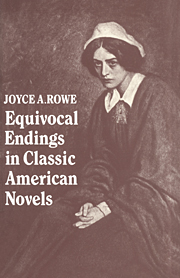 Equivocal Endings in Classic American Novels
Equivocal Endings in Classic American Novels Book contents
- Frontmatter
- Contents
- Acknowledgments
- Introduction
- 1 Nathaniel Hawthorne: “My Kinsman, Major Molineux”: The Several Voices of Independence
- 2 Bleak Dreams: Restriction and Aspiration in The Scarlet Letter
- 3 Mark Twain's Great Evasion: Adventures of Huckleberry Finn
- 4 Strether Unbound: The Selective Vision of Henry James's Ambassador
- 5 Closing the Circle: The Great Gatsby
- Conclusion: Moby-Dick and Our Problem with History
- Notes
- Index
3 - Mark Twain's Great Evasion: Adventures of Huckleberry Finn
Published online by Cambridge University Press: 17 August 2009
- Frontmatter
- Contents
- Acknowledgments
- Introduction
- 1 Nathaniel Hawthorne: “My Kinsman, Major Molineux”: The Several Voices of Independence
- 2 Bleak Dreams: Restriction and Aspiration in The Scarlet Letter
- 3 Mark Twain's Great Evasion: Adventures of Huckleberry Finn
- 4 Strether Unbound: The Selective Vision of Henry James's Ambassador
- 5 Closing the Circle: The Great Gatsby
- Conclusion: Moby-Dick and Our Problem with History
- Notes
- Index
Summary
“He had a dream,” I says, “and it shot him”. “Singular dream,” he says.
The last ten chapters of Huckleberry Finn, with their culmination in Huck's flight to “the Territory,” have been the subject of critical controversy ever since the novel's publication. The meaning of the Phelps Farm episode and its role in the novel's structure has been varyingly interpreted as a literary failure, a cheat of the reader, or a formally correct preparation for Huck's final lighting out. As time has passed and Huckleberry Finn has settled into the status of a classic, the controversy surrounding the ending has only increased. With Huck adopted, as it were, into that family of representative character types which signify the values and ideals of our national consciousness, it becomes more imperative than ever to define his essential character and future prospects. Does Huck grow up or does he remain a boy forever? And, more pertinently, by what standards do we or should we evaluate either of these possibilities? In this regard, there is a particularly instructive comparison to be made between Huck and Pip, the English orphan hero of Charles Dickens's Great Expectations. In many respects their situations are alike, and will be compared in the latter portion of this chapter. But the contrasting resolution of Dickens's novel (and the differences in the pattern of experience from which it derives) helps to establish what I believe to be the distinctively American character of Mark Twain's ending.
Given the emphatically linear form of Huckleberry Finn, one's response to the ending depends largely upon expectations as to how Huck will act and feel derived from the preceding portions of the narrative.
- Type
- Chapter
- Information
- Equivocal Endings in Classic American NovelsThe Scarlet Letter; Adventures of Huckleberry Finn; The Ambassadors; The Great Gatsby, pp. 46 - 74Publisher: Cambridge University PressPrint publication year: 1988


